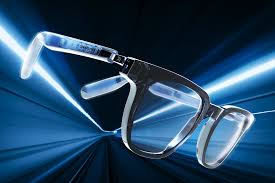Smart Glasses in India: Are They the Future of Eyewear?
By Admin on November 7, 2025

Eyewear is no longer just about improving vision — it is evolving into a smart companion for daily life. In recent years, smart glasses have started gaining attention in India as brands explore blending traditional vision support with modern technology. From fitness tracking to hands-free calls, navigation, and real-time notifications, smart glasses are pushing the boundaries of what eyewear can do.
But the big question remains — are smart glasses really the future of eyewear in India or just another trend? Let’s explore.
What Are Smart Glasses?
Smart glasses look similar to regular spectacles, sometimes even like a branded eyeglasses frame, but come equipped with technology to support daily tasks. Depending on the model, features may include:
Built-in speakers for calls and music
Voice assistant access
AR (Augmented Reality) display
Health and activity tracking
Navigation guidance
Camera functionality
They are designed to keep you connected without needing to constantly check your phone.
Why Smart Glasses Are Growing in India
India’s fast-growing tech culture and digital lifestyle trends are fueling interest in smart glasses. With remote work, fitness culture, and wearable tech like smartwatches rising, tech-enabled eyewear fits perfectly into modern routines.
Key reasons for growing demand:
Hands-Free Convenience
Take calls, navigate, or listen to audio without touching your phone — perfect for busy lifestyles.
Comfortable Alternative to Earbuds
Open-ear audio keeps ears free and safe for outdoor use.
Health & Fitness Benefits
Some models track daily activity, posture, and fitness metrics.
Stylish & Practical
Newer models look sleek, like premium branded eyeglasses frame options, making them suitable for daily wear.
Are Smart Glasses Replacing Traditional Eyewear?
Not yet — but progress is happening quickly.
People still rely mainly on traditional spectacles and sunglasses for daily vision, especially when choosing a branded eyeglasses frame for long-term comfort and durability. However, smart glasses are becoming more mainstream as brands work on improving:
Battery life
Comfort & weight
Prescription lens compatibility
Affordability
With time, smart glasses may blend fully with high-quality branded eyeglasses frame designs to deliver both style and functionality.
Who Can Benefit Most from Smart Glasses?
Smart glasses are especially helpful for:
Professionals & students
Bike riders & commuters
Fitness enthusiasts
Content creators & influencers
Tech-savvy users who prefer hands-free lifestyle
For many, they are a lifestyle upgrade, just like choosing a premium branded eyeglasses frame to improve everyday comfort and look.
Challenges Before Smart Glasses Go Mainstream
Some limitations remain:
Higher cost
Limited battery life
Not all models support prescription lenses
Privacy concerns in camera models
Learning curve for first-time users
As global brands invest more in innovation, these barriers will reduce.
So, Are Smart Glasses the Future?
Yes — smart glasses hold a bright future in India. They may not replace traditional eyewear instantly, but they will play a key role in the future of vision technology. As they evolve, they may blend seamlessly with premium eyewear aesthetics, just like modern branded eyeglasses frame options.
Final Thought
Eyewear is entering a new era — not just to help you see better but to help you live smarter. Smart glasses bring convenience, style, and innovation together, and India is becoming a fast-growing market for this next-gen eyewear revolution.
FAQs
1. What exactly do smart glasses do?
Smart glasses support calls, audio, navigation, alerts in some models, a camera and AR. They offer hands-free convenience without checking your phone.
2. Can I get prescription lenses in smart glasses?
Many models now support prescription lenses, while some still do not. Always check lens compatibility before purchase.
3. Are smart glasses safe for daily use?
Yes, when used responsibly. Avoid using camera-based models in private spaces and stay alert outdoors.
4. Do smart glasses help with eye health?
They don’t treat eye conditions, but they reduce screen usage and can be paired with blue-light/UV lenses for protection.
5. How long does the battery last?
Most smart glasses currently last 4–12 hours depending on usage and model.
6. Are smart glasses worth buying now?
If you multitask often, travel, or love wearable tech, yes — they offer a useful upgrade. Casual users may wait for new models with stronger AR functions.
← Back to Blog